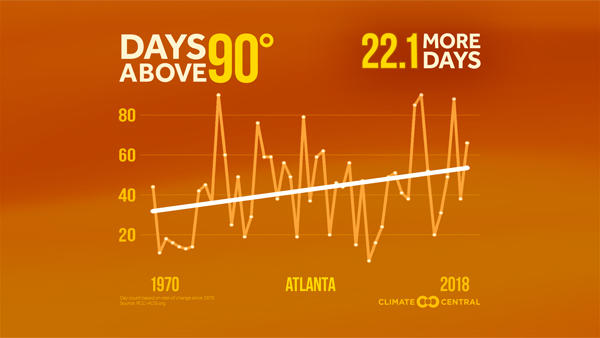Section Branding
Header Content
More Extremely Hot Days Mean Stagnant Air, Health Problems
Primary Content
Intense heat is getting worse with climate change as small increases in temperature can magnify extremes, according to a study by Climate Central, an independent organization of scientists and journalists reporting about climate change and its public impact.
Around the globe, it’s been another summer of blistering heat. Just last month, GPB reported that Georgia could see an average of 77 days each year with a heat index over 105 degrees by the end of the century, according to a study by the Union of Concerned Scientists.
That’s compared to an average of four days a year from 1971 to 2000.
Extreme heat is defined as a long period (two to three days) of high heat and humidity with temperatures above 90 degrees, according to the Centers for Disease Control and Prevention.
In exploration of how annual totals of extremely hot days have changed in local areas, Atlanta was found to have, on average, 22.1 more days above 90 degrees than the city did in 1970.
MORE: Study Finds Warming Climate Will Mean More Extreme Heat
Augusta followed with 21 more days above 95 degrees; Columbus with 16.7 more days above 95 degrees; Savannah with 8.5 more days above 95 degrees; Macon with 4.9 more days above 95 degrees; and Albany with 2.5 more days above 95 degrees, according to the Climate Central study.
Local thresholds are being crossed from Alaska to Arizona. Miami has seen the largest change — the city now sees 75 more days above 90 degrees on average than it did in 1970.
Heat extremes can have serious health consequences. Extreme heat often results in the highest number of annual deaths among all weather-related hazards, according to the CDC.
In extreme heat, evaporation is slowed and the body must work harder to maintain a normal temperature. This can lead to death by overworking the human body.
RELATED: Southern Cities Cross Political Divide To Combat Climate Change
Persistently hot weather patterns can also result in stagnation, a condition in which air pollutants are trapped in the lower atmosphere. These stationary domes of hot air can hold particulates and ground-level ozone, which cause health problems from respiratory distress to eye irritation, the study said.
The number of stagnant days in Atlanta summers has increased from fewer than 10 to over 35 since 1973. Other Georgia cities such as Augusta and Savannah have experienced similar trends.
Though air quality has improved since the 1970 Clean Air Act, the perpetual rise of summer temperatures and warming climate will likely come with more stagnation days — along with health consequences from trapped air pollutants.
If you are under extreme heat warning, there are precautions you can take: find air conditioning, avoid strenuous activities, watch for heat illness, wear light clothing, drink plenty of fluids and never leave people or pets in a closed car.

